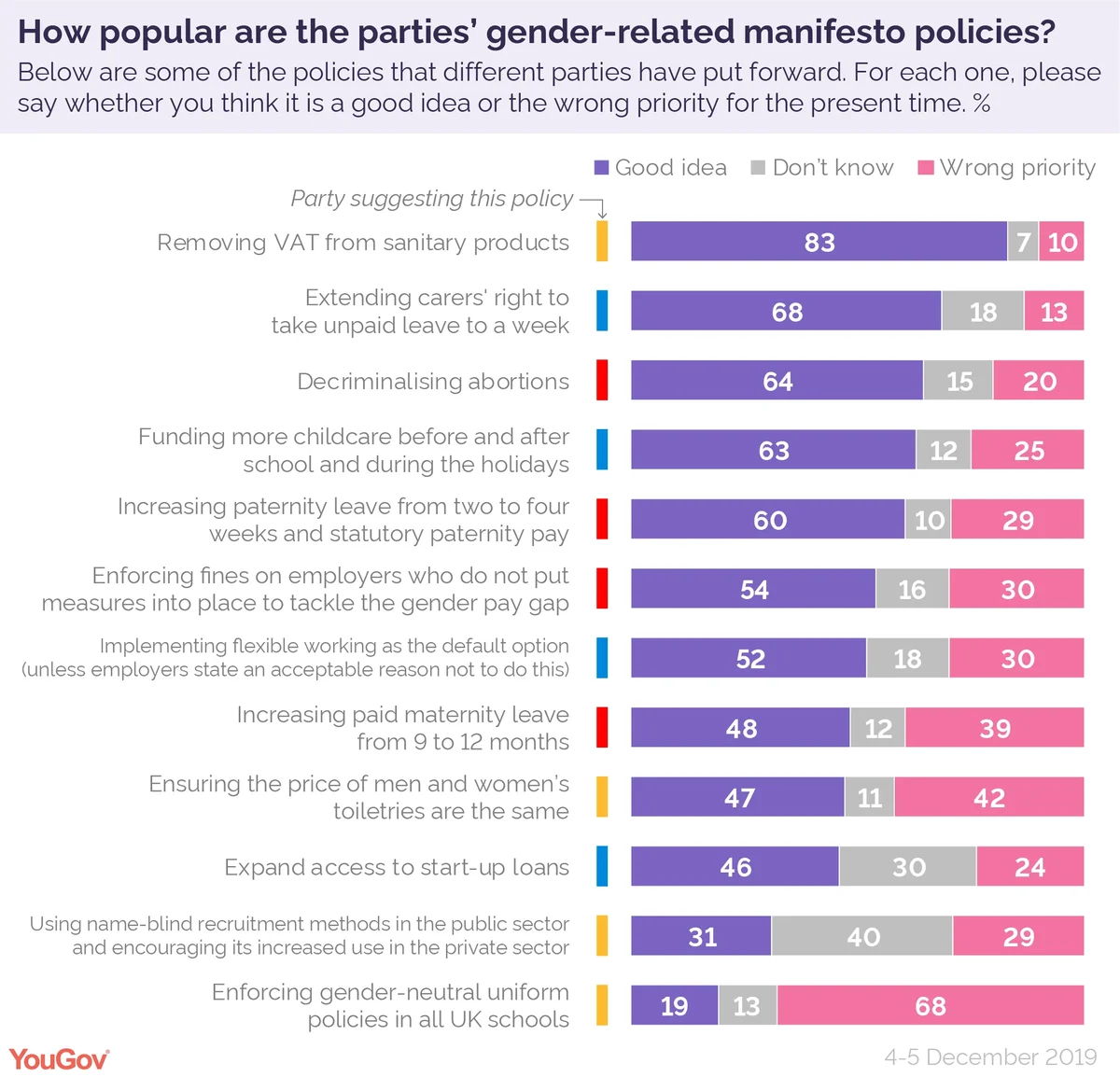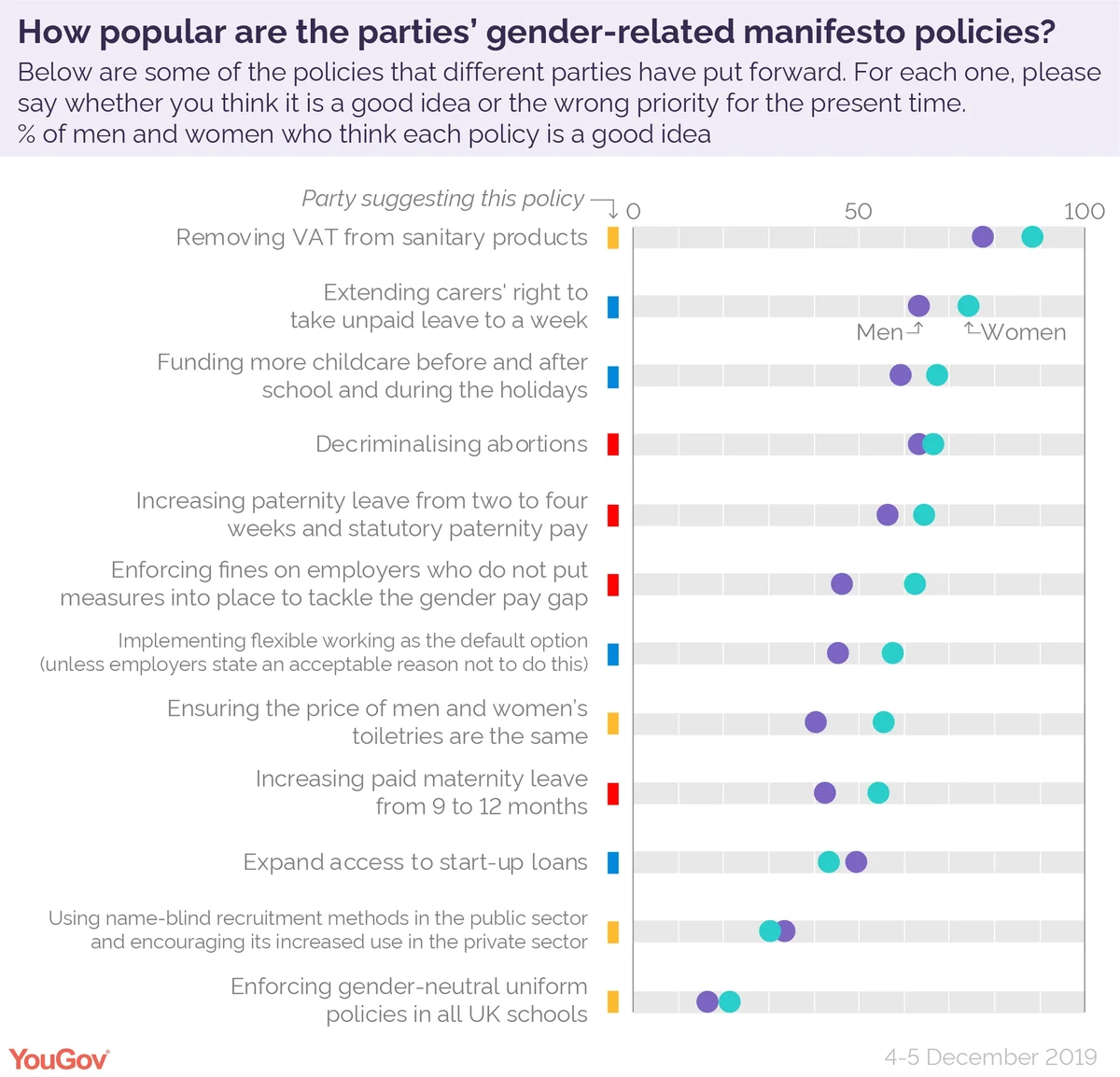With just days until the polls open YouGov explores what support the gender-related policies from the main parties have
Brexit, immigration and the NHS have dominated this election campaign, but new research explores the attitudes of Britons on a range of gender-related policies, especially those which target women specifically, from the main manifestos: the plans which may not have grabbed headlines but could nonetheless have huge impacts on peoples’ lives.
Majority back removing VAT on sanitary products
By far the most popular of the policies we asked about (83%) is the Lib Dem plan to remove VAT from sanitary products. Majorities of all demographic groups back the idea, including 88% of women and those who voted Labour and Conservative in 2017.
However, on a broader level, only half (47%) think tackling the so-called ‘pink tax’, that is equalising the prices of male and female toiletries, is a good idea. Older people are even less likely than the average to back it: just 39% of over 65s do, compared to 62% of those aged from 18 to 24.
Expanding paternity rights and investing in childcare
More Britons think the Labour policy of improving paternity rights should be a higher priority than increasing maternity leave. Three in five (60%) back the increase of statutory paternity pay and leave from two to four weeks, compared to 48% who think the same about increasing paid maternity from nine to 12 months.
Majorities of 2017 Labour (71%) and Lib Dem (74%) voters back extending paternity leave, but 2017 Conservatives are more sceptical (44%).
Young women are particularly keen on improving both maternity and paternity policies, as you may expect as this demographic is more likely to be planning a family, with support from around eight in ten.
Of the two in five Britons (39%) who think extending paid maternity leave is a wrong priority, three in five are 2017 Tory voters (58%) and the same proportion are over 65s (60%).
Investment in childcare during holidays and around school hours is lauded by two in three (63%), but a quarter (25%) consider it the wrong priority. Around half of 2017 Conservative voters and over 50s support this, compared to around seven in ten women, younger people and 2017 Labour and Lib Dem voters.
The least popular policy came from the Lib Dems, who want to enforce gender-neutral uniform policies in all schools. Some 68% of Britons believe this is a wrong priority.
Whilst the majority of 2017 Conservative (88%) and Labour (62%) come to this conclusion, even two thirds of Lib Dems (66%) don’t back their party’s policy. Those who do tend to be younger (28% of 18 to 24s for example) and from London (26%).
Abortion
Legislation from 1967 has legalised abortion at up to 24 weeks. But the previous 19th-century law was not repealed, meaning the procedure is still technically a criminal offence. Two in three (64%) consider Labour’s full decriminalisation of abortions a good idea.
Around seven in ten women (66%) and eight in ten 2017 Labour (77%) and Lib Dem (79%) voters back this policy, compared to 55% of 2017 Tory voters. Legalising abortions is championed by 86% of females aged from 18 to 24.
Equal pay
Other measures such as enforcing fines on employers who don’t actively tackle the gender pay gap (54%) and implementing flexible working as the default option (52%) are considered good ideas by around half the population. However, a notable three in ten (30%) think each of these is the wrong priority.
Two in three 2017 Labour voters (63%) recognise the benefits of the Conservative’s flexible working policy compared to around half of Lib Dems (48%) and 42% of Tory voters.
Views are more mixed when assessing attitudes to business funding and recruitment. In efforts to tackle discrimination, just one in three Britons (31%) think implementing name-blind recruitment methods is a good idea, 29% consider it a wrong priority but the plurality aren’t sure (40%).
Double the proportion of those aged 18 to 24 see the benefits of this compared to their older counterparts (42% 18 to 24 compared to 22% of over 65s).
Photo: Getty











